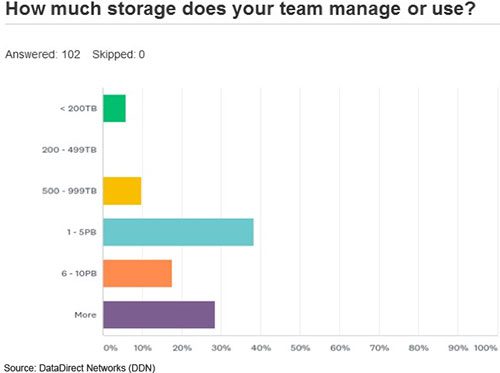Organizations running high performance computing (HPC) workloads are increasingly seeking out cloud-based storage solutions and speedy flash-enabled systems to help them cope with growing complexity and the sheer amounts of data they are managing nowadays, according to new research from DataDirect Networks (DDN).
For starters, organizations are making use of more data, the company found in its survey of over 100 HPC professionals. Eighty-five percent of reported that they are using or managing more than one petabyte (PB) of storage, a 12-percent increase compared to last year’s results. Nearly 30 percent said they in charge of over 10PB of storage.
Protecting your company’s data is critical. Cloud storage with automated backup is scalable, flexible and provides peace of mind. Cobalt Iron’s enterprise-grade backup and recovery solution is known for its hands-free automation and reliability, at a lower cost. Cloud backup that just works.
To help them cope, HPC specialists are turning to the cloud, albeit cautiously.
Nearly half (48 percent) of all respondents said they planned to stash at least some of their data on a public or private cloud, an 11 percent jump compared to 2016. Yet, only five percent of those polled said they expect to place more than 30 percent of their data in the cloud.

Regardless, cloud usage is on the upswing. Forty percent of respondents said they planned to place at least some of their data on the cloud, compared to only 20 percent a year ago.
Flash storage is another technology organizations are using in their complex and resource-intensive HPC workloads.
While flash usage in HPC environments remains steady at 90 percent in basic data center deployments, the amount of data being placed on solid-state drives (SSDs) and other forms of flash storage is on the rise. Currently, most organizations (76 percent) have less than 20 percent of their data on flash but many more organizations expect more of their data to get soaked up by flash-enabled storage systems.
Twenty-five percent of respondents said they expect to pump 20 to 30 percent of their data into flash storage in 2018, while another 10 percent are estimating that they will place 20 to 40 percent of their data on flash storage. Accelerating file system metadata (54 percent) and application-specific data (54 percent) are the top flash use cases.
In terms of challenges, I/O (input/output) bottlenecks remain a big worry among 76 percent of organizations using running complex analytics downloads. Despite flash’s ability to transfer data at a brisk pace, at least compared to traditional hard disk drives, it’s not the cure-all for HPC environments, according to DDN.
“I/O performance is a huge bottleneck to unlocking the power of HPC applications in use today, and customers are beginning to realize that simply adding flash to the storage infrastructure isn’t delivering the anticipated application level improvements,” said Kurt Kuckein, director of marketing for DDN, in a statement. “Suppliers are starting to offer architectures that include flash tiers optimized specifically for NVM [non-volatile memory] and customers are actively pursuing implementations utilizing these technologies.”
Pedro Hernandez is a contributing editor at Enterprise Storage Forum. Follow him on Twitter @ecoINSITE.
Huawei’s AI Update: Things Are Moving Faster Than We Think
FEATURE | By Rob Enderle,
December 04, 2020
Keeping Machine Learning Algorithms Honest in the ‘Ethics-First’ Era
ARTIFICIAL INTELLIGENCE | By Guest Author,
November 18, 2020
Key Trends in Chatbots and RPA
FEATURE | By Guest Author,
November 10, 2020
FEATURE | By Samuel Greengard,
November 05, 2020
ARTIFICIAL INTELLIGENCE | By Guest Author,
November 02, 2020
How Intel’s Work With Autonomous Cars Could Redefine General Purpose AI
ARTIFICIAL INTELLIGENCE | By Rob Enderle,
October 29, 2020
Dell Technologies World: Weaving Together Human And Machine Interaction For AI And Robotics
ARTIFICIAL INTELLIGENCE | By Rob Enderle,
October 23, 2020
The Super Moderator, or How IBM Project Debater Could Save Social Media
FEATURE | By Rob Enderle,
October 16, 2020
FEATURE | By Cynthia Harvey,
October 07, 2020
ARTIFICIAL INTELLIGENCE | By Guest Author,
October 05, 2020
CIOs Discuss the Promise of AI and Data Science
FEATURE | By Guest Author,
September 25, 2020
Microsoft Is Building An AI Product That Could Predict The Future
FEATURE | By Rob Enderle,
September 25, 2020
Top 10 Machine Learning Companies 2020
FEATURE | By Cynthia Harvey,
September 22, 2020
NVIDIA and ARM: Massively Changing The AI Landscape
ARTIFICIAL INTELLIGENCE | By Rob Enderle,
September 18, 2020
Continuous Intelligence: Expert Discussion [Video and Podcast]
ARTIFICIAL INTELLIGENCE | By James Maguire,
September 14, 2020
Artificial Intelligence: Governance and Ethics [Video]
ARTIFICIAL INTELLIGENCE | By James Maguire,
September 13, 2020
IBM Watson At The US Open: Showcasing The Power Of A Mature Enterprise-Class AI
FEATURE | By Rob Enderle,
September 11, 2020
Artificial Intelligence: Perception vs. Reality
FEATURE | By James Maguire,
September 09, 2020
Anticipating The Coming Wave Of AI Enhanced PCs
FEATURE | By Rob Enderle,
September 05, 2020
The Critical Nature Of IBM’s NLP (Natural Language Processing) Effort
ARTIFICIAL INTELLIGENCE | By Rob Enderle,
August 14, 2020

Datamation is the leading industry resource for B2B data professionals and technology buyers. Datamation's focus is on providing insight into the latest trends and innovation in AI, data security, big data, and more, along with in-depth product recommendations and comparisons. More than 1.7M users gain insight and guidance from Datamation every year.
Advertise with TechnologyAdvice on Datamation and our other data and technology-focused platforms.
Advertise with Us
Property of TechnologyAdvice.
© 2025 TechnologyAdvice. All Rights Reserved
Advertiser Disclosure: Some of the products that appear on this
site are from companies from which TechnologyAdvice receives
compensation. This compensation may impact how and where products
appear on this site including, for example, the order in which
they appear. TechnologyAdvice does not include all companies
or all types of products available in the marketplace.